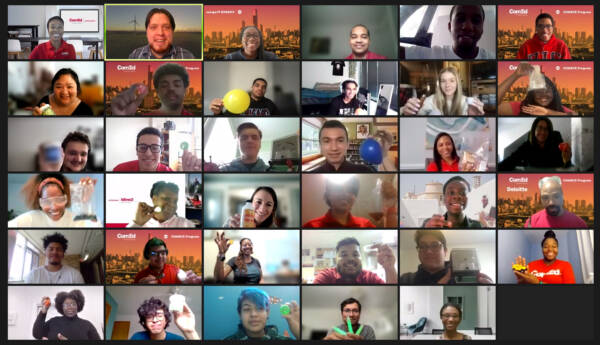NEED provides workshops for specific areas of interest for schools, STEM organizations, professional societies, and utility providers. If you are interested in partnering on workshops in your area or at your school district, be it in-person or in a virtual setting, contact NEED at info@need.org. NEED works with each partner to customize training to fit the program needs.
Virtual Energy Education Workshops
As precautionary measures are taken to combat COVID-19, we understand the need for educators to still have access to engaging, professional development. Our team of experts incorporate best practices from our 40 years of experience supporting educators to implement energy education into their classrooms. Virtual workshops are led by a team of NEED facilitators and designed to incorporate hands-on learning, guest speakers in the energy industry, group breakout sessions, networking and sharing of tips/tricks for teaching in a virtual learning environment.

Local/Regional Energy Education Workshops
NEED works with our state and local partners to provide hundreds of energy education workshops and in services to teachers and students throughout the school year. NEED workshops are designed to help educators implement energy programs in their classrooms while developing student knowledge and leadership skills. Workshops are provided for educators teaching grades K-12. Participants are often encouraged to bring a team of students to be the lead NEED Team in the school. Workshops are presented by local NEED staff, or by a trained NEED Facilitator. NEED also provides professional development workshops to school districts, energy companies, and other training organizations upon request.

View NEED’s upcoming workshops calendar!
Upcoming Workshops
2025 AES Solar Energy Education Workshop – Kapolei, HI
2024 Virtual Louisiana Energy Education Workshop
Workshop Themes
NEED works with individuals, organizations and districts to create trainings that fit specific program needs.
Examples:
- General Energy Workshops – Provide teachers with background in the science of energy, energy sources, electricity generation, transportation, and conservation.
- Science of Energy and Energy Resources Workshops – Teach the forms of energy, energy transformations, renewables and nonrenewables.
- Electricity Workshops – Teach about electrical energy, and the generation and transmission of electricity.
- Petroleum and Natural Gas Workshops – Include instruction about forms of energy with specific components about chemical energy and the exploration, development, production, and uses of petroleum and natural gas.
- Schools Going Solar Workshops – Developed as part of the BP Solar Connection partnership and the Pacific Gas and Electric Company’s Solar Schools Program, these workshops teach about the basics of radiant energy and the uses of solar energy for electricity and heating. These workshops are great for districts with solar installations or those considering solar installations.
- H2 Educate Workshops – As part of the U.S. Department of Energy and State Energy Office partnerships with the Virginia Department of Mines, Minerals and Energy, H2 Educate teaches, for example, about forms of energy, hydrogen development, fuel cells, and transportation technologies.
- Energy Management for Schools Workshops, Conferences, and Training programs – For teachers and for school facilities personnel, school business officials, and school energy managers in partnership with the state energy offices, local utilities, and federal agencies, these programs provide instruction and standards-based activities regarding energy management.
- Nuclear Energy Workshops – Often hosted at nuclear power stations, allowing for teachers to tour stations or visitor centers with the opportunity to expand their knowledge of energy transformations and nuclear energy while learning about the use of uranium to generate electricity. Teachers also learn about current used fuel storage practices and the Yucca Mountain debate.
- Conservation and Efficiency Workshops – Provide teachers the opportunity to learn about energy efficiency technologies and measures, conservation behaviors, and residential energy conservation in an effort to reach students and their families. These workshops are provided in NEED’s Demand Side Management programs sponsored by many utilities – Duke Energy, National Grid, and Commonwealth Edison (ComEd) for example. Families receive home energy efficiency kits to install at home to reduce electricity and gas consumption.
- Wind Workshops – Utilize the curriculum materials sponsored by the American Wind Energy Association and developed by NEED. These workshops are great for school districts interested in installing wind turbines for educational and power generation uses.
- Energy on Public Lands Workshops – Sponsored by the Bureau of Land Management, provides training about energy resources and the development of energy on public lands.
- Transportation Fuels Workshops – For teachers or school decision makers, teaches about the many fuels available to transport people and goods from place to place (including biodiesel, gasoline, ethanol).
Regional/National Conferences and Special Events
View NEED’s conferences calendar, and see if any upcoming events are happening near you!
- Energy Management for Schools Conferences and High Performance Schools Conferences
For energy managers, school facilities personnel, and architects. - Teacher Summer Institutes/Conferences
For educators interested in multi-day professional development, energy field trips, and specialized energy training. - Energy Facilitator Training
For individuals, groups, or organizations interested in building local capacity to deliver NEED and other energy education programs. - Student Summer/Spring Break Energy Camp
For students interested in learning more about energy during spring or summer break. - Student Summer Institutes
For older students interested in learning more about energy and energy career pathways. - Solar Schools Programs
Built on the successful model of PG&E’s Solar Schools program NEED works with partners around the country to provide curriculum and training for schools receiving educational solar installations.


